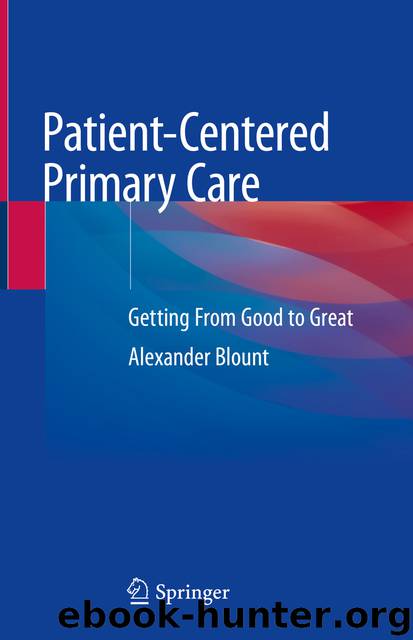Patient-Centered Primary Care by Alexander Blount

Author:Alexander Blount
Language: eng
Format: epub
ISBN: 9783030176457
Publisher: Springer International Publishing
7.4 Open Notes for Multiply-Disadvantaged Patients
We have been particularly concerned with how transparency can be a core element in building a bridge to partnership with multiply-disadvantaged patients. The designers of the open notes pilot were concerned about the effect it would have on patients with low education and low health literacy, especially if they had complex health needs. Wouldn’t these patients be put off by complex medical terminology or by hearing what their doctors said about them? In the initial analysis, the research team expressed surprise to find that these patients were just as enthusiastic about the process as more educated patients who were healthier [10].
A later study, focusing specifically on three groups, less educated patients, nonwhite patients, and sicker patients, highlighted the importance of open notes and transparency in building the bridge to partnership we have been looking for [12]. There was likely to have been substantial overlap in these groups, though that was not addressed in the account of the study. Of the patients responding to the survey, 74% of patients with a high school degree or less education, 71% of African American patients, 70% of Hispanic/Latino patients, and 66% of patients with the poorest self-reported health said that access to their doctors’ notes was extremely important in helping them to be informed about their care and to understand their doctor’s thought processes. These patients had significantly higher rates of placing the highest value on open notes compared to their more advantaged counterparts in the study. Patients with low education levels were nearly three times as likely as better educated patients to rate open notes as extremely important to help them engage in care. Nonwhite patients were twice as likely as whites to rate open notes as extremely important. Patients with the poorest self-reported health were as or more likely than healthier patients to pick the “extremely important” rating [12].
When we discussed the multiply-disadvantaged patients (Chap. 5), those sometimes identified as complex, sometimes as having lower socioeconomic status and low education, and sometimes as having endured traumatic experiences, we found that many reported experiences with healthcare services that they found to be demeaning or to have endured shoddy care which they attributed to their low social status. We found that doctors sometimes give these patients less patient-centered care because they doubt the patients’ abilities to understand the complexity of full descriptions of their conditions and treatments. Doctors may take the lower rates of adherence by these patients to be indications of their difficulties in understanding their health problems and of their need for a more directive rather than a partnering approach. We found that multiply-disadvantaged patients often are focused on the asymmetry of education, income, and power in their relationships with doctors. Trust is very difficult. Any move on the part of the doctor to be personable, to show caring, or to address difficulties that come up in the relationship is likely to be noticed and appreciated. It appears that when a doctor offers open notes, it is taken as just such a move.
Download
This site does not store any files on its server. We only index and link to content provided by other sites. Please contact the content providers to delete copyright contents if any and email us, we'll remove relevant links or contents immediately.
Should I Stay or Should I Go? by Ramani Durvasula(7642)
Why We Sleep: Unlocking the Power of Sleep and Dreams by Matthew Walker(6688)
Fear by Osho(4724)
Flow by Mihaly Csikszentmihalyi(4675)
Rising Strong by Brene Brown(4440)
Why We Sleep by Matthew Walker(4423)
The Hacking of the American Mind by Robert H. Lustig(4361)
How to Change Your Mind by Michael Pollan(4343)
Too Much and Not the Mood by Durga Chew-Bose(4324)
Lost Connections by Johann Hari(4166)
He's Just Not That Into You by Greg Behrendt & Liz Tuccillo(3874)
Evolve Your Brain by Joe Dispenza(3657)
The Courage to Be Disliked by Ichiro Kishimi & Fumitake Koga(3475)
Crazy Is My Superpower by A.J. Mendez Brooks(3384)
In Cold Blood by Truman Capote(3368)
Resisting Happiness by Matthew Kelly(3332)
What If This Were Enough? by Heather Havrilesky(3300)
The Book of Human Emotions by Tiffany Watt Smith(3287)
Descartes' Error by Antonio Damasio(3264)
